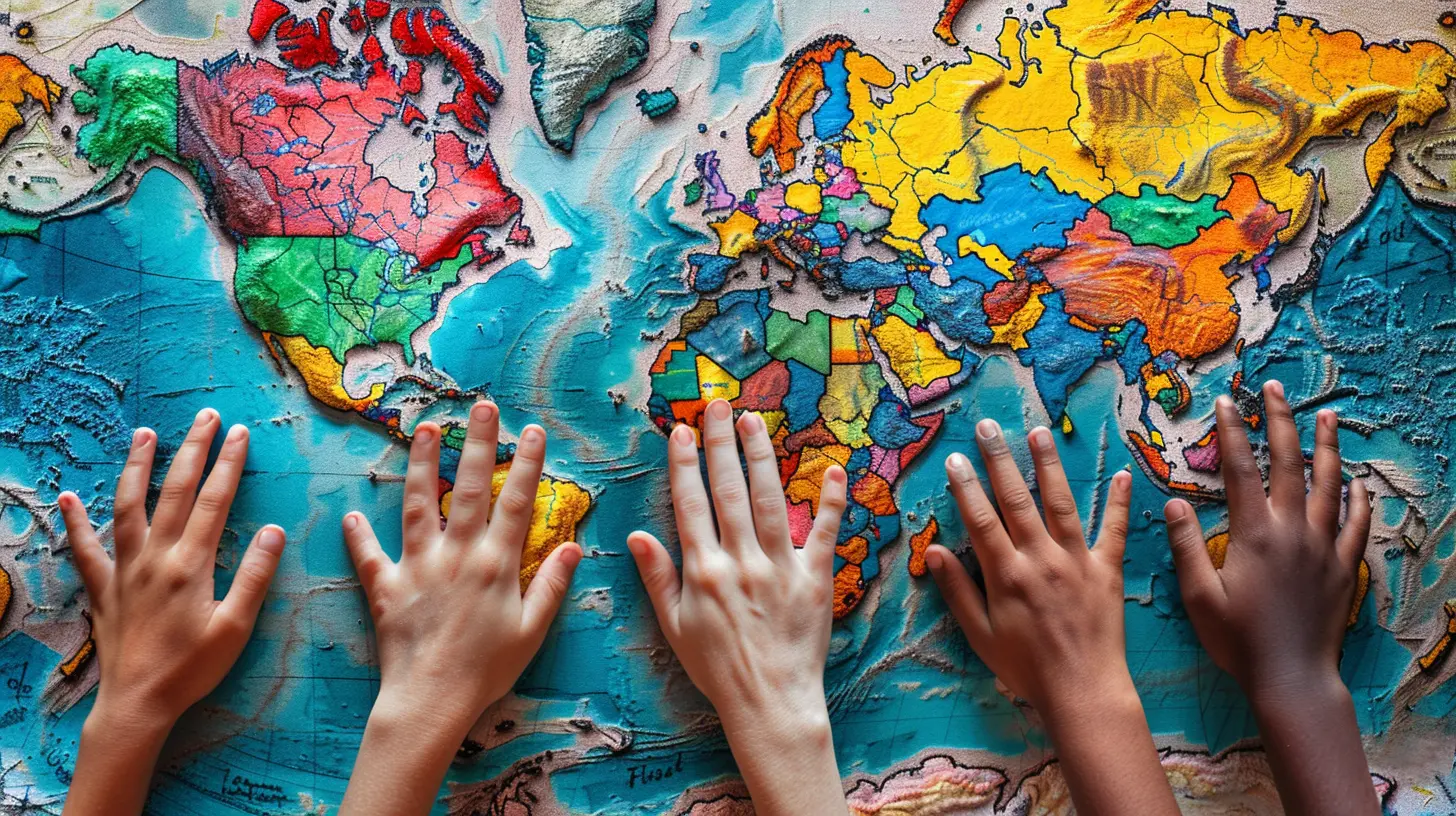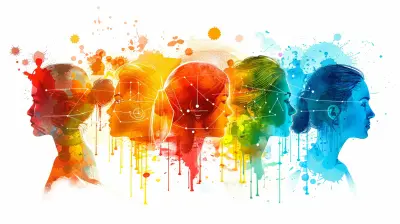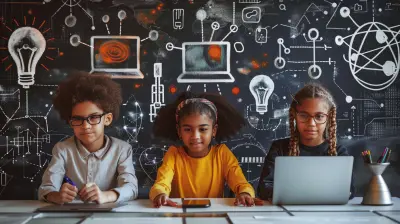The Role of Digital Literacy in Promoting Global Competence
18 November 2025
Let’s be real for a moment — we live in a digital world. From TikTok trends to Zoom meetings, almost everything we do has a digital touch. But here’s the million-dollar question: are we truly equipped to thrive in this hyperconnected, digital-first world?
That’s where digital literacy steps in. It's more than just knowing how to Google something or post on Instagram. It’s a skill set that’s quickly becoming essential — as important as reading and writing once were. And when it comes to being globally competent, digital literacy is the magic key that opens up a world of opportunities.
In this article, we’re diving deep into how digital literacy plays a crucial role in shaping globally competent individuals. So grab your virtual passport, and let’s get into it!
What Is Digital Literacy, Anyway?
Let’s not overcomplicate it. At its core, digital literacy means having the skills to use digital tools smartly, safely, and effectively. It's everything from understanding how social media works to being able to tell fact from fiction online.But it doesn’t stop there. It also includes:
- Navigating digital platforms with ease
- Communicating with others through online channels
- Understanding digital etiquette
- Evaluating online content critically
- Knowing how to protect one's privacy and data
In short, it’s the survival toolkit for the modern digital age.
Global Competence — The Missing Link
Now, let’s switch gears and talk about global competence. It sounds like a fancy buzzword, right? But it’s actually quite simple.Global competence refers to the ability to understand and engage with people from different cultures and backgrounds. It’s about being aware of global issues, appreciating diverse perspectives, and being able to collaborate across boundaries.
Here’s where things get interesting: digital literacy and global competence go hand-in-hand like peanut butter and jelly. One fuels the other.
How Digital Literacy Enhances Global Awareness
Imagine trying to understand the world without the internet. Sounds limiting, doesn’t it? With digital literacy in your toolkit, suddenly the entire globe feels more within reach.Let’s break it down:
1. Access to Diverse Perspectives
The internet gives us close-up views of life in faraway places. With just a few clicks, you can watch a documentary on climate change in the Arctic or read a blog written by a student in Ghana.But here's the catch: if you're not digitally literate, you might not know where to find credible sources or how to question what you read. Digital literacy helps you sort through the noise and find reliable, diverse perspectives.
2. Understanding Cultural Nuances
Ever accidentally offended someone online because of a meme or a comment? Digital literacy also includes knowing digital etiquette across cultures. What’s funny in one country may be completely inappropriate in another.Being aware of these cultural differences, especially in digital interactions, is a massive step towards global competence.
3. Participating in Global Conversations
Twitter threads, Reddit discussions, global webinars — these are all platforms where international conversations are happening in real time.When you’re digitally literate, you can take part in these discussions thoughtfully and respectfully. It allows you to share your voice and truly listen to others — which is what being globally competent is all about.
Education in the Digital Age: Turning Classrooms Into Global Gateways
Classrooms have evolved. We’re no longer confined to dusty textbooks and chalkboards. Thanks to digital tools, students today can collaborate with peers across continents, join virtual exchange programs, and participate in global problem-solving challenges.But none of this is possible without digital literacy.
Teachers as Digital Guides
Educators are now more than just subject experts. They’re guides to the digital world. A well-equipped teacher helps students go beyond basic tech skills and dive into digital citizenship, cybersecurity, and online collaboration.Ever had a class project where you teamed up with a student from a different country through a video call or shared Google Doc? That’s digital literacy in action — and it’s prepping students for a global future.
Virtual Classrooms Break Down Borders
Online learning platforms have leveled the educational playing field. Whether you're in a big city or a remote village, if you’re digitally literate, you can access top-notch education, learn new languages, or take part in global initiatives.Digital literacy removes barriers and opens doors to global experiences that were once limited to the privileged few.
Digital Literacy as a Tool for Empathy and Inclusion
We often talk about digital skills in technical terms, but let’s not forget the human side of things.Building Empathy Through Stories
Think about how powerful it is to watch a video showing someone’s life in a refugee camp or hear a podcast about gender equality in different cultures. These digital stories do something that textbooks can’t — they make us feel.When we engage with these stories critically and compassionately, we don’t just consume content — we connect. And that connection builds empathy, one of the core components of global competence.
Promoting Digital Inclusion
Here’s the thing: not everyone has equal access to digital tools. Digital literacy isn’t just about knowing how to use a computer — it’s also about fighting for digital equity so that everyone, regardless of their background, has the opportunity to be part of the global conversation.A truly globally competent society is one where everyone has a seat at the table, not just those with the latest gadgets.
The Dark Side of the Digital World: Misinformation and Bias
Okay, time for a reality check. The digital world isn’t all sunshine and hashtags.Fake news, echo chambers, algorithmic bias — these are real issues. If we’re not digitally literate, we can fall into these traps and form opinions based on misinformation.
The Power of Critical Thinking
Digital literacy teaches us to question what we see. It encourages us to verify sources, look for bias, and think before we share.In a world filled with misinformation, being able to think critically is not just a nice-to-have — it’s a must-have. It helps us engage with global issues truthfully and responsibly.
Social Media and Global Dialogue: A Double-Edged Sword
Social media, love it or hate it, is where a lot of global conversations are happening. But it's not always a happy place.The Good: Global Awareness at Scale
Movements like #BlackLivesMatter and #ClimateStrike gained worldwide attention thanks to social media. People from every corner of the world could join in, show support, and push for change.Without digital literacy, though, it’s easy to misunderstand or misrepresent these movements.
The Bad: Keyboard Warriors and Troll Armies
We've all seen online arguments spiral out of control. Without digital literacy, respectful dialogue often flies out the window.That's why being globally competent online means knowing how to communicate clearly, listen actively, and avoid the rabbit hole of toxic debates.
The Workplace Wants Digital and Global Thinkers
Let’s talk future careers. The majority of jobs today require some level of digital fluency. But employers are looking for more than hard skills.They want people who can:
- Collaborate with international teams
- Understand global markets
- Communicate across cultures
- Adapt to changing, tech-driven environments
In other words, they want candidates who are both digitally literate and globally competent.
So, if you’re looking to future-proof your career, start brushing up on both.
How to Build Digital Literacy That Promotes Global Competence
All this sounds great, but how do we actually get there? Let’s talk strategy.1. Digital Literacy in School Curricula
Schools need to make digital literacy a core part of the curriculum — right up there with math and science. From the early years, students should learn:- How to evaluate online content
- Digital communication skills
- Cyber safety and privacy
- Ethical content creation
2. Global Projects and Collaborations
Encourage international school partnerships, virtual exchanges, and global classroom challenges. There’s no better way to instill global competence than through real-world experiences.3. Teacher Training Programs
Educators should receive ongoing training in digital tools and global learning strategies. After all, they set the tone for how students see the digital world.4. Community Engagement and Parental Support
Parents and communities play a role too. Hosting digital literacy workshops and encouraging open conversations about global issues at home can make a big difference.Final Thoughts: A 21st-Century Superpower
To wrap it all up — digital literacy isn’t just about using tech tools. It’s about using those tools to build bridges across cultures, tackle global challenges, and create meaningful connections.In a world that’s changing faster than ever, digital literacy is the superpower we all need to become truly global citizens.
So the next time you scroll through your feed or hop on a video call with someone from another country, remember — you’re not just using technology. You’re participating in a global dialogue. And that’s pretty powerful, don’t you think?
all images in this post were generated using AI tools
Category:
Digital LiteracyAuthor:

Monica O`Neal
Discussion
rate this article
1 comments
Zephyrwind McKay
This article highlights the essential link between digital literacy and global competence, emphasizing how technology skills empower individuals to navigate an interconnected world.
November 18, 2025 at 5:13 AM

Monica O`Neal
Thank you for your insightful comment! I'm glad you found the connection between digital literacy and global competence compelling.


